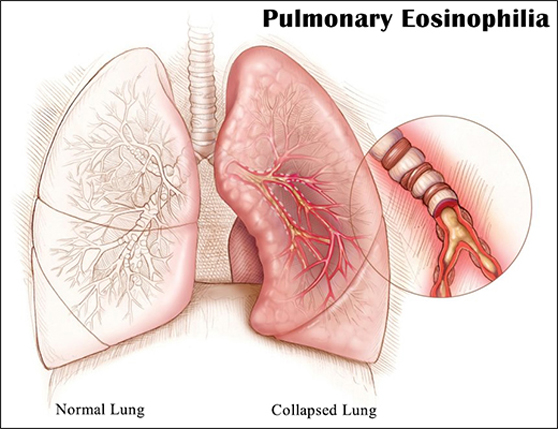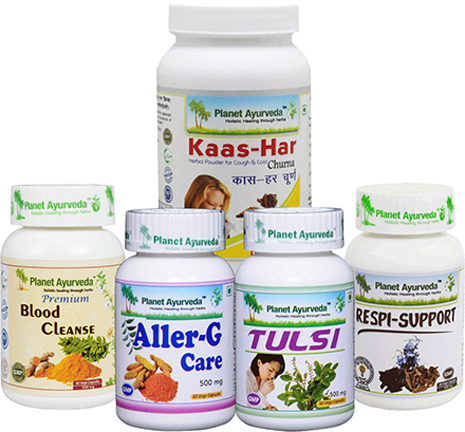Eosinophilic Lung Disease/Pulmonary Eosinophilia And Its Ayurvedic Management
Abstract
Pulmonary diseases are the diseases that affect parts of the respiratory tract and majorly the lungs. There are a number of causes that can lead to pulmonary diseases. The causes include infections, tobacco smoke, asbestos, air pollution and radon. Pulmonary diseases include chronic obstructive pulmonary disease, pneumonia, lung cancer, pulmonary eosinophilia, pulmonary fibrosis etc. In the text below we shall have a detailed look into Pulmonary Eosinophilia. Moreover, we shall also discuss the management of the same in the contemporary system of medicine as well as in the traditional system of Ayurvedic medicine. Let’s get some details!!

Introduction – Kidney Disease
Pulmonary eosinophilia is defined as the infiltration of the eosinophils into the lungs and parts of the respiratory tract. Pulmonary eosinophilia is also known as Tropical Eosinophilia. It is also named as Eosinophilic Lung Disease. There are a number of causes that increase the number of eosinophils in the lungs such as various infections, malignancies, autoimmune responses, obstructive lung disease etc. Pulmonary Eosinophilia characterised by asthmatic attacks, coughing , enlarged spleen. Usually the condition is dominant or frequently found in Southeast Asia and India. In Ayurveda, the condition is well compared with raktavaha and pranavaha srotas dushti as well as kapha dosha dushti. We shall have a detailed ayurvedic view later in this text.
Causes of Eosinophilic Lung Disease
Causes of Eosinophilic Lung Disease Causes of primary eosinophilia have no exact cause known including acute eosinophilic pneumonia, eosinophilic granulomatosis with polyangiitis, hypereosinophilic syndrome and chronic eosinophilic pneumonia. Secondary pulmonary eosinophilia have known causes such as parasites, radiation effects, malignancies, medications and allergic bronchopulmonary aspergillosis.
Signs and Symptoms
- Recurrent and persistent cough
- Weight loss
- Weakness
- Enlarged lymph nodes
- Chest pain
- Bleeding in cough and wheeze
Investigations
- History that supports the exposure to lymphatic filariasis
- Peripheral eosinophilia count more than 3 × 109/L
- Increased antimalarial antibodies
- Response to diethylcarbamazine
Differential diagnosis
- Intestinal flukes
- Mucormycosis
- Respiratory failure
- Tuberculosis
- Zygomycosis
- Scleroderma
- Sarcoidosis
- Nematode infections
- Intestinal fibrosis
Management of Eosinophilic Lung Disease
- Diethylcarbamazine in three divided doses for twenty one days.
- Side effects of the drug are fever, gastrointestinal discomfort, pruritus and headache. And eosinophilic count falls.
Ayurvedic aspect of Eosinophilic Lung Disease
Ayurveda is a traditional system of Indian medicine and stands on the principle of three dosha (vata, pitta, kapha) and other various components such as dhatu, agni, srotas etc. In short, Ayurveda is a vast subject that emphasises its project or aim of redressing the diseased people and maintaining the health of healthy people. Eosinophilic lung disease can be well correlated with the raktavaha srotas dushti and vitiation of kapha dosha due to blocked microchannels. cough, sneezing and lymph enlargement is due to aggravated kapha dosha. Furthermore, weight loss, weakness and bleeding from the respiratory tract can be compared with raktavaha srotas dushti. As the cause of Eosinophilic pulmonary disease is mostly caused by infective organisms thus the condition can be compared with heen vyadhikshmatava or low immunity.
So all these patogenesis is connected due to low immunity leading to infection that causes raktavaha sroto dushti and in the end doshas are aggravated and obstruct the pranavaha srotas which produces symptoms of the Eosinophilic Lung Disease. The management is this based on boosting immunity, treating the dushti of rakta, alleviating the symptoms and providing wellness to the respiratory system. There are a number of herbs that alleviate symptoms of the respiratory ailments such as tulsi (Ocimum sanctum), Ela (Elettaria cardamomum), chitrak (Plumbago zeylanica), kantakari (Solanum virginianum), pippli (Piper longum) etc. Formulations such as vidangadi lehya, agastya haritaki, guduchayadi ghrita, kasmardadi ghrita, mahamanjisthadi kwath, khadirarishta are beneficial in the condition of Pulmonary eosinophilia.
Herbal Remedies for Eosinophilic Lung Disease by Planet Ayurveda
Planet Ayurveda is an eminent GMP certified, ISO 9001:2015 certified and US-FDA registered Ayurvedic Company, which adheres to the objective of manufacturing quality Ayurvedic products as mentioned in a number of ancient texts of Ayurveda. Formulations are manufactured without additives and preservatives and other kinds of chemicals or artificial flavouring agents which can have a number of side effects on the human body. Products manufactured at Planet Ayurveda are pure and devoid of any kind of adulteration. The products are purely organic and vegetarian and gluten free and halal certified. Planet Ayurveda extends its products that are efficient in managing the condition of Eosinophilic Lung Disease and its associated symptoms.
Following is the list of formulations that are helpful in managing Eosinophilic Lung Disease :
- ALLER-G CARE
- PREMIUM BLOOD CLEANSE
- TULSI CAPSULES
- RESPI-SUPPORT
- KAAS-HAR CHURNA


Product description
1. ALLER-G CARE
As the name of the product suggests it is beneficial in alleviating symptoms of allergy. Aller-G Care capsules are enriched with the goodness of haridra (Curcumin longa), neem (Azadirachta indica), shirish (Albizia lebbeck), ashwagandha (Withania somnifera). All the herbs pacify the aggravated dosha, which results in alleviating the associated symptoms of the kapha dosha. The herbs have antiinflammatory and analgesic properties therefore it soothes the respiratory mucosa.. All the herbs together do a magnificent job in curing the various allergic reactions. It soothes the skin and provides relief from the itchiness and also purifies blood. As it purifies blood thus helps in addressing raktavaha srotas dushti. With all these actions Aller-G Care capsules are beneficial in Eosinophilic Lung Disease.
Dosage : Two capsules twice a day with plain water after meals.
1. PREMIUM BLOOD CLEANSE
Premium blood cleanse capsules are composed of the blood purifying herbs such as haridra (Curcuma longa) and neem (Azadirachta indica). As there is dushti of raktavaha srotas and infectious toxins are flowing in the blood, so it becomes mandatory to clean the blood. Cleaning the blood will stop multiplication of the toxins which produce symptoms of the disease and hence are helpful in preventing advancement of Eosinophilic Lung Disease.
Dosage : One capsule twice a day with plain water after meals.
3. TULSI CAPSULES
Tulsi capsules are filled with the wonderful properties of the herb tulsi (Ocimum sanctum). Tulis is known for its vata kapha har properties. Tulis is useful in flu like symptoms as well as allergic conditions and symptoms associated with the respiratory system. It is useful in alleviating cough, cold and runny nose. It cleanses the blood. It acts as an anti-inflammatory, thus soothes the inflammation of the respiratory mucosa. It further manages the pyretic conditions. Furthermore, tulsi enhances immunity. With such tremendous properties within a single herb which makes it a must to be used in Eosinophilic Lung Disease.
Dosage : One capsule twice a day with plain water after meals.
4. RESPI-SUPPORT
Karchoor (Curcuma zedoaria), Bharangi (Clerodendrum serratum), Pippali (Piper longum), Chironji (Buchanania latifolia), Shathi (Hedychium spicatum).
The ingredients possess anti inflammatory, blood purifying, helps in shortness of breath, kapha vata ghan , antipyretic properties and relieves cough and hiccups. Shathi is best indicated in eosinophilia. Therefore, Respi-Support capsules are vital in managing the Eosinophilic Lung Disease.
Dosage : Two capsules twice a day with plain water after meals.
5. KAAS-HAR CHURNA
As the name of the churna indicates it is used in destroying or relieving cough. The constituents of the churna are Mishri (Crystallised Sugar Lumps), Vanshlochan (Bambusa arundinacea), Pippali (Piper longum), Ela (Elettaria cardamomum), Dalchini (Cinnamomum zeylanica). All the herbs together suppress and manage the excessive coughing caused due to Eosinophilic Lung Disease. Further, the herbs also help in alleviating other flu like symptoms such as runny nose, shortness of breath, blocked nose etc.
Dosage : One teaspoon twice a day with honey.
Contact Planet Ayurveda Support Team to provide you the costing / ordering and delivery information at – costing.planetayurveda@gmail.com or Call at 0172-521-4030 (India), +91-172-521-4030 (Outside India) or Whatsapp at (+91) 9915-593-604
Conclusion
Eosinophilic Lung disease characterised by infiltration of the eosinophils into the respiratory system such as lungs and airway tract. There can be a bunch of causes that lead to the above said condition. The condition manifests as cough, shortness of breath, asthma-like features, cough, sneezing, hemoptysis, enlarged lymph nodes, pain etc. As we have seen treatment available in the contemporary system of medicine that exhibits a number of side effects. Whereas Ayurveda offers help by promising management of the condition from its root cause. Ayurvedic management focuses on the pacification of the vitiated dosha, correcting srotas dushti and also alleviating symptoms of the particular condition. In the case of Eosinophilic Lung Disease, the management is based on cleansing the blood, alleviating symptoms of the same, pacifying the vitiated dosha, boosting immunity and managing sroto dushti. Products mentioned and detailed above are beneficial in fighting the condition of Eosinophilic Lung Disease.
Dr. Vikram Chauhan
Latest posts by Dr. Vikram Chauhan (see all)
- ALTERNATIVE AYURVEDIC TREATMENT FOR CHRONIC KIDNEY DISEASE - July 24, 2024
- Ayurvedic Treatment for Liver Disease with Herbal Remedies - July 22, 2024
- Ayurvedic Treatment For Diabetes Mellitus With Herbal Remedies - July 4, 2024
- Ayurvedic Aspect Of Liver And Management Of Liver Diseases - July 3, 2024
- Natural Ayurvedic Treatment For Fibromyalgia With Herbal Remedies - July 2, 2024




